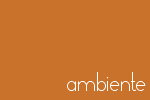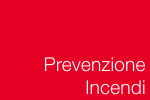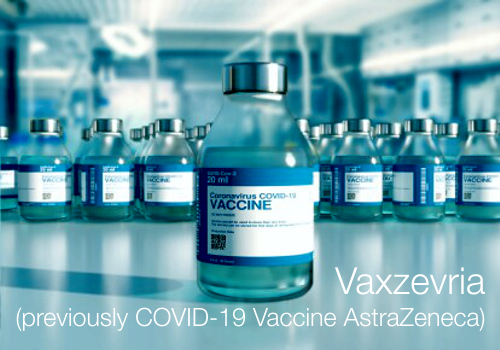Vaxzevria (previously COVID-19 Vaccine AstraZeneca)
EMA, 30.03.2021
COVID-19 Vaccine (ChAdOx1-S [recombinant])
This medicine is authorised for use in the European Union.
Overview
Vaxzevria is a vaccine for preventing coronavirus disease 2019 (COVID-19) in people aged 18 years and older. COVID-19 is caused by SARS-CoV-2 virus.
Vaxzevria is made up of another virus (of the adenovirus family) that has been modified to contain the gene for making a protein from SARS-CoV-2.
Vaxzevria does not contain the virus itself and cannot cause COVID-19.
Detailed information about this vaccine is available in the product information, which includes the package leaflet.
How is Vaxzevria used?
Vaxzevria is given as two injections, usually into the muscle of the upper arm. The second dose should be given between 4 and 12 weeks after the first dose.
Arrangements for the supply of the vaccine will be the responsibility of national authorities. For more information about using Vaxzevria, see the package leaflet or consult a healthcare professional.
How does Vaxzevria work?
Vaxzevria works by preparing the body to defend itself against COVID-19. It is made up of another virus (adenovirus) that has been modified to contain the gene for making the SARS-CoV-2 spike protein. This is a protein on the surface of the SARS-CoV-2 virus which the virus needs to enter the body’s cells.
Once it has been given, the vaccine delivers the SARS-CoV-2 gene into cells in the body. The cells will use the gene to produce the spike protein. The person’s immune system will then recognise this protein as foreign and produce antibodies and activate T cells (white blood cells) to attack it.
If, later on, the person comes into contact with SARS-CoV-2 virus, their immune system will recognise it and be ready to defend the body against it.
The adenovirus in the vaccine cannot reproduce and does not cause disease.
What benefits of Vaxzevria have been shown in studies?
Combined results from 4 clinical trials in the United Kingdom, Brazil and South Africa showed that Vaxzevria was safe and effective at preventing COVID-19 in people from 18 years of age. These studies involved around 24,000 people altogether. Half received the vaccine and half were given a control injection, either a dummy injection or another non-COVID vaccine. People did not know if they had been given the test vaccine or the control injection.
The Agency based its calculation of how well the vaccine worked on the results from study COV002 (conducted in the UK) and study COV003 (conducted in Brazil). The other two studies had fewer than 6 COVID-19 cases occurring in each, which was not enough to measure the preventive effect of the vaccine. In addition, as the vaccine is to be given as two standard doses, and the second dose should be given between 4 and 12 weeks after the first, the Agency concentrated on results involving people who received this standard regimen.
These showed a 59.5% reduction in the number of symptomatic COVID-19 cases in people given the vaccine (64 of 5,258 got COVID-19 with symptoms) compared with people given control injections (154 of 5,210 got COVID-19 with symptoms). This means that the vaccine demonstrated around a 60% efficacy in the clinical trials.
Most of the participants in these studies were between 18 and 55 years old. There were not enough results in older participants (over 55 years old) to provide a figure for how well the vaccine will work in this group. However, protection is expected, given that an immune response is seen in this age group and based on experience with other vaccines; as there is reliable information on safety in this population, EMA’s scientific experts considered that the vaccine can be used in older adults. More information is expected from ongoing studies, which include a higher proportion of elderly participants.
Can people who have already had COVID-19 be vaccinated with Vaxzevria?
There were no additional side effects in the 345 people who received Vaxzevria in the trial and had previously had COVID-19.
There were not enough data from the trial to conclude on how well Vaxzevria works for people who have already had COVID-19.
Can Vaxzevria reduce transmission of the virus from one person to another?
The impact of vaccination with Vaxzevria on the spread of the SARS-CoV-2 virus in the community is not yet known. It is not yet known how much vaccinated people may still be able to carry and spread the virus.
How long does protection from Vaxzevria last?
It is not currently known how long protection given by Vaxzevria lasts. The people vaccinated in the clinical trials will continue to be followed for 1 year to gather more information on the duration of protection.
Can children be vaccinated with Vaxzevria?
Vaxzevria is not currently authorised for use in children. EMA has agreed with the company on a plan to conduct trials involving children at a later stage.
Can immunocompromised people be vaccinated with Vaxzevria?
There are limited data on immunocompromised people (people with weakened immune systems). Although immunocompromised people may not respond as well to the vaccine, there are no particular safety concerns. Immunocompromised people can still be vaccinated as they may be at higher risk from COVID-19.
Can pregnant or breast-feeding women be vaccinated with Vaxzevria?
Preliminary animal studies do not show any harmful effects in pregnancy, however data on the use of Vaxzevria during pregnancy are very limited. Although there are no studies on breast-feeding, no risk from breast-feeding is expected.
The decision on whether to use the vaccine in pregnant women should be made in close consultation with a healthcare professional after considering the benefits and risks.
Can people with allergies be vaccinated with Vaxzevria?
People who already know they have an allergy to one of the components of the vaccine listed in section 6 of the package leaflet should not receive the vaccine.
Allergic reactions (hypersensitivity) have been seen in people receiving the vaccine. As for all vaccines, Vaxzevria should be given under close medical supervision, with the appropriate medical treatment available in case of allergic reactions. People who have a severe allergic reaction when they are given the first dose of Vaxzevria should not receive the second dose.
How well does Vaxzevria work for people of different ethnicities and genders?
The clinical trial included people of different ethnicities and genders. The efficacy was maintained across genders and ethnic groups.
What are the risks associated with Vaxzevria?
The most common side effects with Vaxzevria in the trials were usually mild or moderate and got better within a few days after vaccination. The most common side effects are pain and tenderness at the injection site, headache, tiredness, muscle pain, general feeling of being unwell, chills, fever, joint pain and nausea. They affected more than 1 in 10 people.
Vomiting and diarrhoea occurred in less than 1 in 10 people. Decreased appetite, dizziness, sweating, abdominal pain and rash occurred in less than 1 in 100 people.
Allergic reactions have occurred in people receiving the vaccine. As for all vaccines, Vaxzevria should be given under close supervision with appropriate medical treatment available.
Why is Vaxzevria authorised in the EU?
Vaxzevria offers a good level of protection against COVID-19 which is a critical need in the current pandemic. The main trials showed that the vaccine has around 60% efficacy. Most side effects are mild to moderate in severity and are gone within a few days.
The European Medicines Agency decided that Vaxzevria’s benefits are greater than its risks and it can be authorised for use in the EU.
Vaxzevria has been given ‘conditional authorisation’. This means that there is more evidence to come about the vaccine (see below), which the company is required to provide. The Agency will review any new information that becomes available and this overview will be updated as necessary.
What information is still awaited for Vaxzevria?
Since Vaxzevria has been given conditional authorisation, the company that markets the vaccine will continue to provide results from the clinical trials, which are ongoing. These trials and additional studies will provide information on how long protection lasts, including against new variants of the virus, how well the vaccine prevents severe COVID-19, how well it protects older people, immunocompromised people, children and pregnant women, and whether it prevents asymptomatic cases.
In addition, independent studies of COVID-19 vaccines coordinated by EU authorities will also give more information on the vaccine’s long-term safety and benefit in the general population.
The company will also carry out studies to provide additional assurance on the pharmaceutical quality and testing of the vaccine as the manufacturing continues to be scaled up.
What measures are being taken to ensure the safe and effective use of Vaxzevria?
Recommendations and precautions to be followed by healthcare professionals and patients for the safe and effective use of Vaxzevria have been included in the summary of product characteristics and the package leaflet.
A risk management plan for Vaxzevria is also in place and contains important information about the vaccine’s safety, how to collect further information and how to minimise any potential risks. A summary of the RMP is available.
Safety measures will be implemented for Vaxzevria in line with the EU safety monitoring plan for COVID-19 vaccines to ensure that new safety information is rapidly collected and analysed. The company that markets Vaxzevria will provide monthly safety reports.
As for all medicines, data on the use of Vaxzevria are continuously monitored. Suspected side effects reported with Vaxzevria are carefully evaluated and any necessary action taken to protect patients.
Other information about Vaxzevria
COVID-19 Vaccine AstraZeneca received a conditional marketing authorisation valid throughout the EU on 29 January 2021.
The name of the vaccine was changed to Vaxzevria on 25 March 2021.
...
Fonte: EMA
Collegati




















